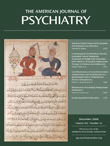Managing the Academic-Industrial Complex
To the Editor: Two recent editorials in the Journal have highlighted conflict of interest issues in psychiatry (1 , 2) . The more recent editorial was occasioned by the publication of two separate articles in leading journals in which the authors failed to adequately disclose conflict of interest information, resulting in substantial negative publicity for our field in the lay press (e.g., 3 ). The Journal is to be commended for both bringing these events to the attention of its readers and for articulating its own reasonable conflict of interest policy.
One aspect of the Journal ’s conflict of interest policy deserves special comment. The editors state “… we will include with commentary articles a disclosure of the author’s relevant interests with a notation that an editor has reviewed the article to discern and exclude bias in its conclusions or its clinical recommendations” ( 1 , p. 572) and “… disclosures are reviewed by the editors for any evidence of bias as part of the decision for publication” ( 2 , p. 1481). That is, the content of the relevant articles will be assessed by an independent editor to ensure that it is appropriate and unbiased. It is no longer sufficient for authors just to list conflicts of interest and caveat lector . The content of review manuscripts is now explicitly fair game in the editorial conflict of interest review process—and why not for all manuscripts? This editorial stance will trickle down and stimulate attention to conflict of interest issues during the peer review process as well.
Our interests as researchers and clinicians are frequently interdependent with those of the pharmaceutical and device industries. As researchers, the days are long gone when we could depend only on federal funds (with the possible exception of Veteran’s Administration researchers); the well-tuned grant portfolio now typically includes federal, foundation, and industry support. As clinicians, we depend on industry support of our life-long learning activities through speakers bureaus for continuing medical education presentations, sponsorship of educational (and “didacto-social” and “didacto-culinary”) events, paid journal supplements, and advertising that helps to keep our journals afloat. Thus, there is, without doubt, an academic-industrial complex—and we are all part of it.
How this system will be reined back in when competing interests fall out of balance, and kept focused on the welfare of our patients, is the critical issue. The solution—in our pluralistic, capitalistic, and independence-oriented society—will be multifaceted. It will include some regulation, some oversight by mutual consent such as the journal peer review process, and hopefully little trial-by-popular press, few sanctions, and no litigation. The Journal ’s opening of the content of review articles to editorial conflict of interest review is a strong statement and one that will stimulate the entire review process toward a more active consideration of conflict of interest issues.
1. Lewis DA, Michels R, Pine DS, Schultz SK, Tamminga CA, Freedman R: Conflict of interest. Am J Psychiatry 2006; 163:571–573Google Scholar
2. Freedman R, Lewis DA, Michels R, Pine DS, Schultz SK, Tamminga C, Patterson SL, McIntyre JS, Goldman HH, Yudofsky SC, Hales, RE, Rapaport MH, Hales, D, Krajewski J, Kupfer DJ, Badaracco MA, Scully JH: Conflict of interest, round 2. Am J Psychiatry 2006; 163:1481–1483Google Scholar
3. Editorial. Our conflicted medical journals. New York Times, 7/23/06Google Scholar



